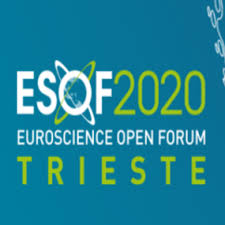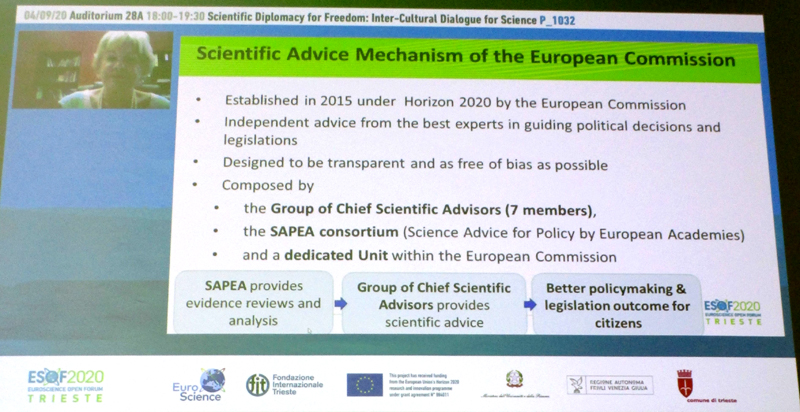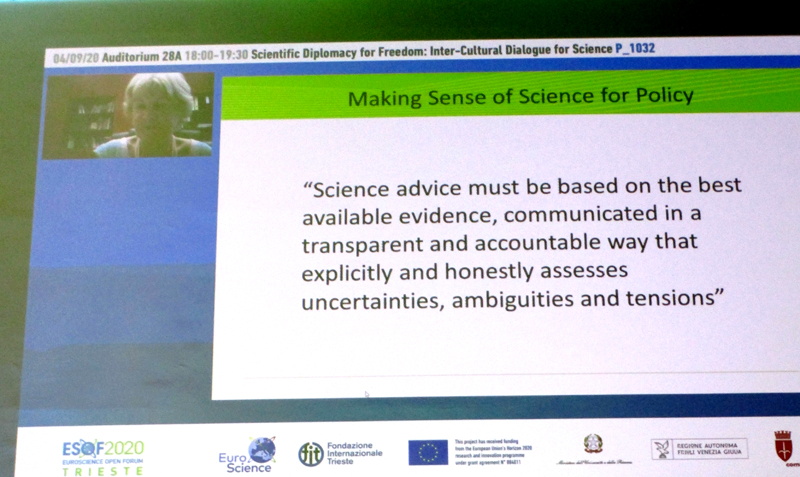Scientific Diplomacy for Freedom: Inter-Cultural Dialogue for Science
EuroScience Open Forum (ESOF) Trieste 2020#
September 4, 2020 6:00 - 7:30 p.m.Event website

Download the scientific programme

Video recording of the ESOF session is available.#
of the ESOF session is available.#
This joint proposal exhibits synergies between members of the Department of Humanities of the University of Trieste (in collaboration with the Academia Europaea) and the National Institute of Oceanography and Applied Geophysics (in collaboration with The World Academy of Sciences
 ). It is designed as an interactive, multidisciplinary round table with two interrelated parts (with an East/West and North/South topicality), each of them last 45' (5' introduction, 20-30' for one or two rounds of moderator's questions with speakers' answers, and 10 for questions from the floor).
). It is designed as an interactive, multidisciplinary round table with two interrelated parts (with an East/West and North/South topicality), each of them last 45' (5' introduction, 20-30' for one or two rounds of moderator's questions with speakers' answers, and 10 for questions from the floor).
The basis of the proposal is the belief and understanding that in the post Covid-19 world, science has taken center stage in world diplomacy to address a global challenge that disregards national borders, and bears controversially upon individual, academic and social freedoms: While some times building bridges, at others deepening gaps between democracies and other forms of governments. The pandemic has developed open access to scientific knowledge and know-how, data sharing and evidence-based policy making: and yet a pervasive issue is whether Covid-19 is the latest spectre of the Cold War to surface in tensions between West and Middle East.
The policy perspective of Part One uses history as a prism with foci on science and society:
- looking back to the historical role of science diplomacy during the Cold War's West-East divide, we shall examine the variety of actors involved, beyond scientists and decision - or policy makers and explore a differentiated multi-valent social approach;
- regarding current transnational policy of the pan-European regional networking of the Academia Europaea and the ERC, especially regarding Central and East European Countries, we seek to enhance prospects of visibility and effective participation for scholars of marginalized countries and to strengthen their inclusion in internationally responsible scientific communities.
The policy perspective of Part Two focuses on the role of science and scientific research diplomacy in resolving conflicts, creating conditions for dialogue and steering the world toward more cooperation.
Speakers#
- Onsite Moderator Cinzia Ferrini MAE
Department of Humanities, University of Trieste
- Remote speaker Mohamed Hassan
The World Academy of Sciences - TWAS
- Remote speaker Eva Kondorosi MAE
Hungarian Academy of Sciences, Biological Research Center
- Onsite moderator Ghribi Mounir
National Institute of Oceanography and Applied Geophyscis - OGS
- Onsite speaker Elisabetta Vezzosi
University of Trieste
- Remote speaker Lassina Zerbo
Comprehensive Nuclear-Test-Ban Treaty Organization CTBTO
Organization#
- All the participants in the conference will receive unique codes to enter streaming contents of the conference.
- All the sessions (physical, hybrid and virtual ones) will be live streamed on the dedicated platform.
- All the accesses will be sent by email before the Opening of the Conference.
The platform will be accessible from 1 September.
Gallery#
Prof. Eva Kondorosi - Question 2#
ESOF in Trieste has the mission to open a window on Balkan and Eastern European Countries. You have served as Vice-President of the European Research Council and chaired the working Group on Widening European
Participation. You are also a distinguished member of the pan-European Academia Europaea where you also established a working group on Widening European Participation.
What is your view on this topic: how to help researchers of Eastern European Countries to gain equal access to European-funded research programs, or to Create conditions to integrate otherwise peripheral academic personnel, circumstances and resources?
What do you see as the most effective way to make progress here, and what do you see as the role for the 'Academy of Europe'?
What is your view on this topic: how to help researchers of Eastern European Countries to gain equal access to European-funded research programs, or to Create conditions to integrate otherwise peripheral academic personnel, circumstances and resources?
What do you see as the most effective way to make progress here, and what do you see as the role for the 'Academy of Europe'?





